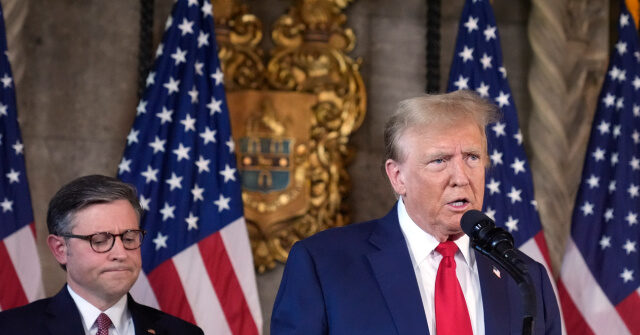In recent days, President-elect Donald Trump has expressed growing skepticism toward House Speaker Mike Johnson’s capacity to effectively lead the Republican conference in the upcoming legislative cycle. Trump’s influence over the House Republicans is significant enough that he could potentially facilitate Johnson’s ousting from the Speakership if he were to signal disapproval. While Trump has not completely severed ties with Johnson, his remarks indicate a shift, suggesting a lack of confidence in Johnson’s ability to navigate challenges, especially with a contentious spending measure on the table.
Trump’s comments about Johnson’s leadership first surfaced after what he deemed a disastrous day for the Speaker. He made it clear during an interview that aspects of the recent spending package were “unacceptable” and labeled it a “Democrat trap.” This situation poses a dilemma for Johnson, as the pressure mounts to satisfy Trump’s expectations while also facing the possibility of a government shutdown looming ahead of Christmas. This precarious balance means Johnson’s leadership could be jeopardized if he fails to adhere to Trump’s outlined demands tied to the spending legislation.
The dynamics within the Republican Party indicate a potential uprising against Johnson’s leadership. With a slim Republican majority in the House, Johnson’s position is particularly tenuous; he can afford to lose only one Republican vote to secure his role as Speaker when Congress reconvenes in early January. Already, dissent has emerged, exemplified by Rep. Thomas Massie from Kentucky, who has publicly stated he will not support Johnson, signaling a fracture within party unity that makes Johnson’s position increasingly precarious.
Despite the challenges facing Johnson, Trump’s commentary suggests that he still believes in the possibility for Johnson to retain his position, provided he takes decisive action against what Trump refers to as “traps” set by the opposition. Trump has conveyed that if Johnson acts firmly and decisively against the perceived pitfalls in the spending package, he could “easily remain speaker.” This statement seemingly provides Johnson a lifeline, but carries with it the weighty expectation that he must deliver on urgent reform amidst rising tensions within the party.
The challenge for Johnson goes beyond managing party dynamics; it involves navigating the complex landscape of negotiations within Congress. As the deadline for budgetary resolutions draws near, Johnson must also contend with the implications of a possible government shutdown, which could significantly undermine his already fragile authority. His capability to address Trump’s demands while also reassuring his colleagues about a cohesive Republican strategy will be critical in the coming weeks.
In summary, the internal conflict within the Republican Party, exacerbated by Trump’s conditional support for Speaker Johnson, illustrates the delicate nature of party politics. With pressures mounting from both the party leadership and external Democratic strategies, Johnson finds himself at a crossroads. As he attempts to solidify his Speakership amidst growing dissent, the task of uniting a splintered party against an imminent government funding crisis lies heavily on his shoulders. The outcome of this political struggle will undoubtedly shape the trajectory of the Republican conference in the next legislative term.

